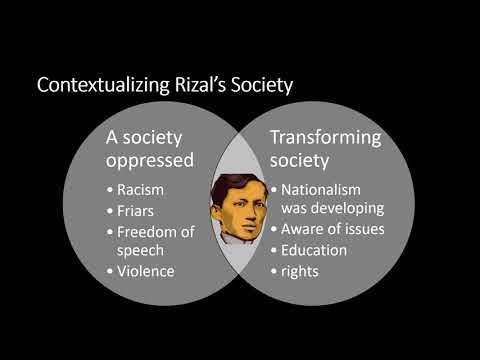Rizal in the Context of 19th Century Philippines (Economic and Political Developments)
Summary
TLDRThis lecture introduces the historical context of the 19th-century Philippines, focusing on economic, political, cultural, and religious developments that shaped Filipino nationalism. It discusses the transition from a mercantilistic to a free trade economy, the rise of the export economy, and the emergence of the Filipino middle and upper class. The lecture also covers Spain's political instability, frequent changes in governor generals, and the negative effects on the Philippines, including corruption and lack of basic services, which fueled Filipino nationalism.
Takeaways
- 📚 The lecture focuses on understanding the context of 19th-century Philippines to comprehend the life and works of Dr. Jose Rizal.
- 🌟 The 19th century in the Philippines is significant as it was the era when Rizal lived, from 1861 to 1896.
- 💼 Economic development in the 19th century Philippines transitioned from a mercantilist system to a free trade economy, opening up trade opportunities.
- 🚢 The opening of ports like Cebu, Iloilo, and Manila to world trade led to the rise of the export economy and increased demand for Philippine agricultural products.
- 🏛️ The economic growth resulted in the rise of the Filipino middle and upper class, who played a crucial role in the agricultural sector and the export economy.
- 🏫 The rise of the middle and upper class led to the education of their children, who later became influential figures like Rizal, fostering nationalism.
- 🏛️ Political instability in Spain during the 19th century, marked by the struggle between liberals and conservatives, affected the Philippines negatively.
- 👨✈️ Frequent changes in Spanish governance, with 41 governor generals in 45 years, led to inconsistent policies and hindered development in the Philippines.
- 📉 The political situation in Spain resulted in the Philippines becoming a dumping ground for incompetent bureaucrats, leading to widespread corruption and dissatisfaction.
- 🚀 The lecture suggests that economic and political developments in the 19th century were catalysts for the rise of Filipino nationalism.
Q & A
What is the significance of understanding the context of the 19th century Philippines in relation to Rizal's life?
-Understanding the context of the 19th century Philippines is crucial to comprehend why Rizal became who he is today. It helps to analyze the economic, political, cultural, and religious developments during his time, which shaped his views and actions.
How long was the Philippines a colony of Spain?
-The Philippines was a colony of Spain for more than 300 years, specifically for 333 years.
What was the economic system that Spain used to monopolize the economy of the Philippines during the early part of the 19th century?
-The economic system used by Spain to monopolize the economy was mercantilism, which involved strict government regulation of trade and foreign trading monopolies.
What change in economic policy occurred in the 19th century Philippines?
-In the 19th century, there was a shift from a mercantilistic economy to a free trade laissez-faire economy, marked by the opening of ports like Cebu, Iloilo, and Manila to world trade.
What was the impact of opening the ports to world trade on the Philippine economy?
-The opening of the ports to world trade led to the rise of the export economy, increased demand for agricultural products, and the eventual rise of the Filipino middle and upper class.
How did the rise of the Filipino middle and upper class contribute to Filipino nationalism?
-The rise of the Filipino middle and upper class led to the education of their children, who then learned the spirit of nationalism in school. This education became a catalyst for the rise of Filipino nationalism.
What was the political situation in Spain during the 19th century?
-Spain in the 19th century was characterized by intermittent civil wars between liberals, who wanted democracy and freedom, and conservatives, who wanted to maintain the status quo with the royal family in power.
How did the political instability in Spain affect the Philippines?
-The political instability in Spain led to frequent changes in governor generals, which resulted in inconsistent policies, failure to provide basic needs, and limited participation of Filipinos in government, contributing to the development of Filipino nationalism.
What were the negative effects of Spain's political instability on the Philippines?
-The negative effects included the constant replacement of governor generals, leading to no consistent policies, projects not being finished, and the Philippines becoming a dumping ground for inept bureaucrats.
Why did the Filipino people develop a sense of nationalism in the 19th century?
-Filipino nationalism developed as a result of the economic and political developments, where the people had enough of the corruption, mismanagement of taxes, lack of basic services, and limited participation in government, leading them to clamor for change.
Outlines

This section is available to paid users only. Please upgrade to access this part.
Upgrade NowMindmap

This section is available to paid users only. Please upgrade to access this part.
Upgrade NowKeywords

This section is available to paid users only. Please upgrade to access this part.
Upgrade NowHighlights

This section is available to paid users only. Please upgrade to access this part.
Upgrade NowTranscripts

This section is available to paid users only. Please upgrade to access this part.
Upgrade NowBrowse More Related Video

Rizal in the Context of 19th Century Philippines (Cultural Development)

Religious Development during the 19th Century

02 - 19th Century Philippines as Rizal's Context | Life and Works of Rizal

[Group 4 Report] Schumacher's Rizal in the Context of the 19th Century Philippines

Simbolismo Portugal [Prof. Noslen]

HIS007 Session 2
5.0 / 5 (0 votes)